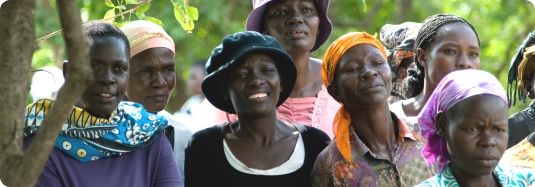Beekeeping in Kenya: Pretty Sweet for a Small Business

Mary, a mother of six, lives with her family in the Kenyan province of Nyanza. Like many others in the region, she has often had trouble making ends meet. Until recently, her family’s only income was from their small farm, which is facing difficulties as a result of years of droughts and floods. Mary had little free time because a large portion of every day was spent fetching water for cooking, drinking and bathing.
To support Mary and others like her, Episcopal Relief & Development is working with its longtime partner Inter Diocesan Christian Community Services (IDCCS) on an integrated approach to community development. IDCCS is the development arm of three dioceses within the Anglican Church of Kenya: Bondo Nyanza, Maseno South and Maseno West.
For local women, one of the most important facets of the program is the introduction of a water tank for community use. Now, Mary and her neighbors no longer spend hours fetching water for household use. They are free to use their time for other pursuits, including activities that allow them to earn additional income.
For example, Mary has been able to become a member of her local cooperative. The group recently received training and equipment from IDCCS that will enable them to keep bees and produce honey. In addition to using a portion of the honey for their families’ consumption, members of the cooperative will also work together to bottle honey for sale in local markets.
“Providing the equipment and technical training for small businesses like beekeeping is one of the greatest ways to spur economic development,” said Rob Radtke, President of Episcopal Relief & Development. “It builds a skill base in the community, unleashing human capacity and enabling people to transform their lives themselves.”
The beekeeping business will quickly become self-sustaining. Having been supplied with basic equipment and training, the group will purchase jars for the honey. They will sell the hygienically sealed jars with quality assurance labels from the Kenyan regulatory board, enabling them to charge higher prices than honey sold without quality verification.
“Teaching cottage industries like beekeeping gives the power to individuals,” said Radtke. “The skills they acquire are something they can hold on to, build on and teach to others.”
In addition to the program in Mary’s community, IDCCS operates similar programs throughout the Nyanza province. For instance, some local cooperatives have been provided with the technology to process sunflower seeds into oil, a staple in the region. Other groups have begun raising goats, using the milk to feed their families and sell in the community. Many of the groups are already earning income from these endeavors, which is helping them support their families.
“It’s a joy to see people transform their own lives with these simple technologies,” said Janette O’Neill, Episcopal Relief & Development Program Officer. “We look forward to collaborating with IDCCS on a new strategic plan that will empower people in the Nyanza province to live more fulfilling and productive lives.”


